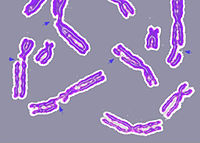
Photo from wikipedia
Chemoresistance is the primary cause of chemotherapy failure. Compelling evidence shows that micro RNAs (miRNAs) contribute to reprogram cancer cells toward a resistant phenotype. We investigate the role of miRNAs… Click to show full abstract
Chemoresistance is the primary cause of chemotherapy failure. Compelling evidence shows that micro RNAs (miRNAs) contribute to reprogram cancer cells toward a resistant phenotype. We investigate the role of miRNAs in the response to acute treatment with 5‐FU in colon cancer‐resistant cells. We performed a global gene expression profile for the entire miRNA genome and found a change in the expression of four miRNAs following acute treatment with 5‐FU. Among them, we focused on miR‐210‐3p, previously described as a key regulator of DNA damage repair mechanisms and mitochondrial metabolism. We show that miR‐210‐3p downregulation enables resistant cells to counteract the toxic effect of the drug increasing the expression of RAD‐52 protein, responsible for DNA damage repair. Moreover, miR‐210‐3p downregulation enhances oxidative phosphorylation (OXPHOS), increasing the expression levels of succinate dehydrogenase subunits D, decreasing intracellular succinate levels and inhibiting HIF‐1α expression. Altogether, these adaptations lead to increased cells survival following drug exposure. These evidence suggest that miR‐210‐3p downregulation following 5‐FU sustains DNA damage repair and metabolic adaptation to counteract drug treatment.
Journal Title: Molecular Carcinogenesis
Year Published: 2019
Link to full text (if available)
Share on Social Media: Sign Up to like & get
recommendations!